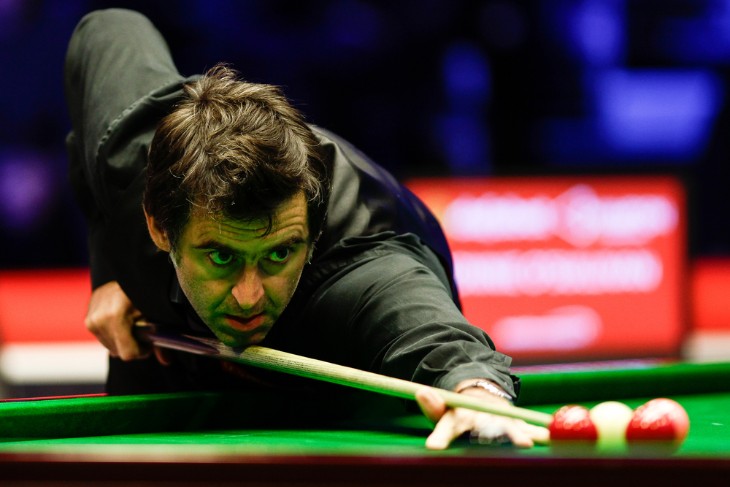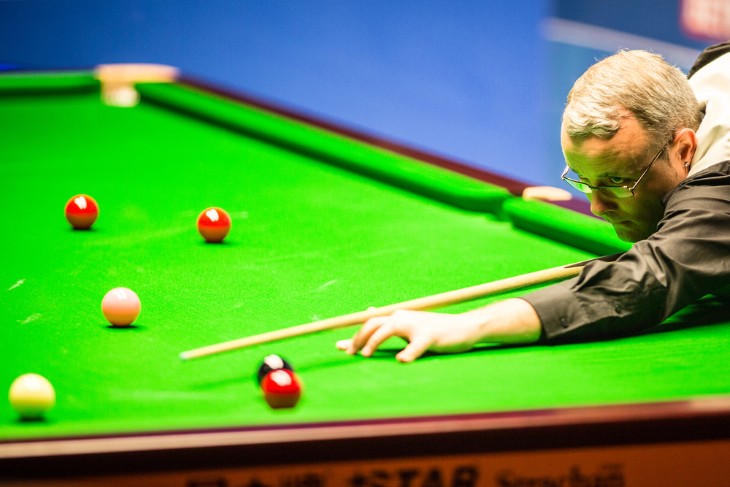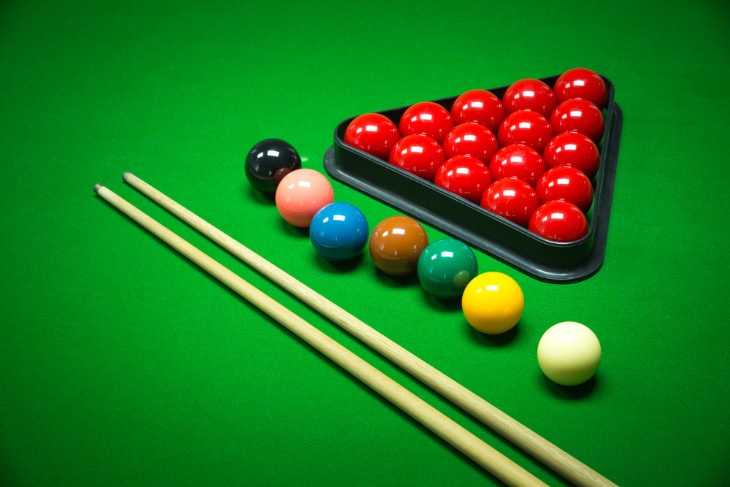The Psychology of Concentration
Beyond potting, snooker requires immense psychological concentration. Maintaining unwavering focus over long periods is a hallmark of elite players. Snooker's slow pace amplifies the need for sustained attention, making it ideal for honing concentration skills.
- Hour-long frames require continual concentration to avoid crucial mistakes.
- Distractions like audience noise must be blocked out during play.
- Mental resilience is vital, recovering quickly from missed shots.
Composure under pressure is also imperative with little margin for error. Reading the opponent's intentions compounds the mental aspects.
- Pressure increases in prestigious tournaments with large prizes and rankings at stake.
- Seeing how opponents play key shots provides insight into their style and tendencies.
- Adopting an emotionally detached, objective mindset allows better focus.
In the world of snooker, the equipment and table setup are vital for accurate gameplay. The standard snooker table is 12 feet by 6 feet, with a finely textured green cloth that provides an ideal playing surface. The table has six pockets, one at each corner and two in the middle of the long sides, where players aim to pot the balls. The high quality of the cloth, cushions, and smoothness of the playing surface enable the precision required in snooker. Players depend on the consistent roll and bounce of the balls to effectively plan their shots.
- Snooker tables are precisely leveled to ensure a flat playing surface, which allows for accurate ball motion.
- The cloth on snooker tables is brushed in a particular direction each day to maintain consistent ball friction.
- Special spotlights are used in professional snooker to eliminate shadows and ensure optimal visibility.
The cues used in snooker are meticulously crafted using materials like ash and maple wood. A well-balanced cue with a smooth tip is key for precisely striking the cue ball. Additionally, snooker balls are made from high-quality phenolic resin to guarantee perfect spherical shape and uniform weight distribution. The balls have intricate colors, allowing players to distinguish between them and strategize sequences.
- Snooker cues weigh between 17 to 21 ounces to provide adequate power while maintaining control.
- Professional cues cost £1000 to £5000 due to intricate craftsmanship and rare woods.
- The tip of quality snooker cues uses layered leather for maximum friction and spin generation.

Rules and Regulations of Snooker
Snooker follows a strict set of rules set by the World Professional Billiards and Snooker Association. A fundamental rule is the sequence of potting balls, starting with reds followed by colors in ascending point value. Players must call shots, specifying the ball and pocket for each attempt. This adds strategy and demands concentration.
- Fouls like touching a ball when not in play lead to a minimum 4-point penalty.
- Failure to hit the called ball results in a "miss", allowing the opponent to re-position balls.
- Points from potted reds alternate with points from a colored ball before attempting the next red.
The "foul and a miss" rule is critical. If a shot is missed, the opponent can force a redo or reposition the balls. This encourages accuracy, as any miss provides a tactical advantage.
- The opponent has the option to make the fouling player take the shot again.
- Balls can be strategically repositioned to block key lines of access to balls.
- A deliberate miss to leave the balls safe is allowed but risky if deemed unsportsmanlike.
How Snooker Enhances Focus
Snooker's deliberate nature demands tremendous focus from players. Each shot requires assessing position, angles, and outcomes. This develops exceptional concentration on the task at hand, spanning from potting to cue ball positioning.
- Focus narrows down to the cue, cue ball, and object ball, blocking out surroundings.
- Laser-like focus when aligned on a shot enables subconscious motor skills to take over.
- Total concentration while opponents take shots ensures planning ahead for next opening.
Moreover, snooker can be an intense mental battle, requiring focus on both the current shot and overall game strategy. This level of focus hones cognitive skills like decision-making that apply beyond snooker.
- Tactical exchanges test focus by applying counter moves to opponent maneuvers.
- Quick recovery after lost points prevents downward spirals through renewed concentration.
- Learning opponents' tendencies requires astute focus across entire matches.
Cognitive Skills Developed Through Snooker
Beyond a cue sport, snooker hones various mental skills. A primary cognitive skill developed is memory, as players recall shot sequences, strategies, and table states. This strengthens short and long-term memory capacity.
- Remembering which reds are remaining helps plan the optimal approach.
- Recall of entire shot sequences is needed to review gameplay and strategies.
- Holding many ball positions in memory minimizes re-scanning of the table.
Strategic thinking is also vital in snooker, from shot choices to cue ball positioning. This high-level analysis cultivates skills like planning, problem-solving, and decision-making.
- Predicting shot outcomes several turns in advance enables creating effective strategies.
- Weighing risk-reward tradeoffs for offensive versus defensive shots is key for strategy.
- Pattern recognition of table states optimizes decision making as similar situations arise.
Snooker as a Strategic Game
Snooker involves strategy beyond just potting balls. Success requires outmaneuvering opponents through position and counter-position. This enhances cognitive skills in key areas.
- Strong analytical thinking develops from assessing table layouts and shot choices.
- Long-term planning is needed, envisioning ideal positioning several shots ahead.
- Pattern recognition helps spot repetitive table states to optimize strategy.
Firstly, snooker strengthens analytical skill. Players evaluate risks, rewards, and outcomes of different shots and strategies. This analytical ability can improve real-world decision-making.
- Cost-benefit analysis is applied when deciding between aggressive versus defensive shots.
- Simulating shot sequences in the mind's eye enables deeper analysis before execution.
- Breaking down complex table layouts methodically improves overall analytical thinking.
Secondly, snooker encourages extensive planning. Top players think multiple shots ahead, devising routes to maximize points and control. This long-term planning aptitude applies widely.
- Setting up prime position for the next high-value color after potting a red is crucial.
- Safety shots require planning several moves in advance to achieve optimal ball spacing.
- Adopting secondary strategies helps navigate unexpected situations that arise.
Benefits for Memory and Problem-Solving
Remembering shot order, table layouts, and game strategies trains memory capacity beyond snooker. The constant problem-solving of assessing table position and planning shots also strengthens real-world problem-solving skills.
- Holding game plans in memory frees up mental resources for in-the-moment decisions.
- Recalling past games' strategies aids in deciding effective approaches for new games.
- Enhanced visual memory translates to improved spatial awareness and navigation.
Moreover, snooker involves continuous problem-solving to score points while limiting risks. This ability transfers to solving everyday problems. Snooker players often find their decision-making and analysis improve in personal and professional realms.
-Calculating optimal cue ball speed and spin for desired ball movements involves intense problem-solving. -Quick but methodical problem-solving is needed when table situations turn unfavorable. -Creative problem-solving explore unconventional shot options for unique table layouts.

Snooker for Stress Reduction
Snooker has a rich and storied history tracing back to the British Army in India. In the 1870s, army officers stationed in Jabalpur created early forms of the game to pass time and regulate mess hall billiards. The game spread in popularity across the British Empire throughout the late 1800s, formalizing into modern snooker by the early 1900s.
Since turning professional in 1926, snooker has witnessed tremendous growth and innovation. Iconic players like Joe Davis dominated the early decades, helping popularize snooker through exhibition matches. The introduction of the World Championship in 1927 and BBC broadcasting starting in 1969 propelled it into the mainstream. Color televisions and tobacco sponsorships accelerated this rise to prominence throughout the 1970s and 1980s.
In the modern era, snooker continues to captivate audiences, especially throughout Britain and China. Top tournaments like the World Championship, UK Championship, and Masters attract devoted followings. Star players like Ronnie O'Sullivan and Judd Trump regularly make headlines while competing for the top ranking. Continual improvements in equipment and broadcasting sustain public enthusiasm in the sport today.
Surprisingly, snooker can alleviate stress through relaxation and mental escape. The methodical pace and need for concentration provide mindfulness, diverting the mind from stressors.
- The routine of setting up and resetting shots creates a meditative calm.
- Deep focus on the present moment provides respite from stressful thoughts.
- The mental workout of concentration promotes a good night's sleep.
Additionally, snooker's social nature fosters community and support. Friendly competition and camaraderie enhance overall well-being and reduce tension.
- Light banter while playing releases stress through laughter and bonding.
- Achieving small goals like pocketing a difficult shot provides satisfaction.
- Rotating opponents frequently prevents the angst of protracted head-to-head matchups.
Conclusion
In summary, snooker offers multifaceted cognitive benefits alongside its entertainment value as a cue sport. The game's reliance on sustained concentration, memory, problem-solving, and analytical thinking engages the mind on a broad scale. Snooker's measured pace and social nature also promote general well-being. With further innovation and research, snooker has promising potential as a structured cognitive training activity, offering a holistic brain workout.
For more information:




.webp)


 (1).webp)




















